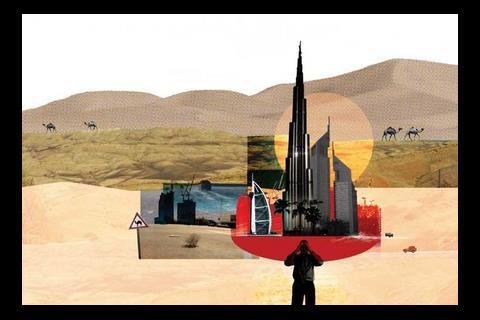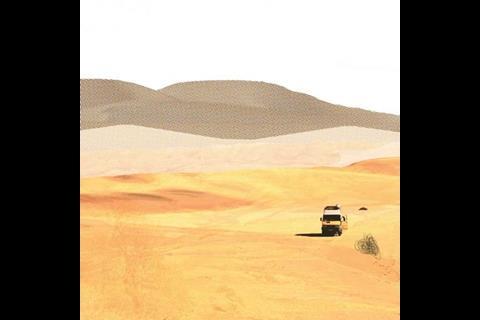When the recession brought work in Dubai to a virtual standstill, it triggered an exodus of expat professionals. But not everybody went home. ¤ÖÑÇèÓú½ talks to some of the survivors to find out how life in the UAE has changed
Iãm sitting in traffic pretty regularly on my way to work now ã thatãs a pretty good sign.ã That might seem an odd reaction from someone who leaves the house at 6.30 in the morning to drive at least an hour to work, but Caroline Lassen lives in Dubai and, for her, itãs a sign that life is returning to the market. As a project manager for Mace now working in Abu Dhabi sheãs seen a booming market come crashing down ã and hopefully now, come out the other side.
From the headlines in the papers, youãd be forgiven for assuming Dubai has gone from the most frenetic place in the world to a ghost town. Sites and offices deserted, abandoned 4x4s in airport car parks, tower cranes still, tumbleweed blowing down the Sheikh Zayed Road and through the beach bars. But though the market did indeed come to a very abrupt halt just over a year ago and much of the expat construction industry left en masse as the work dried up, there were others who have been living and working through the slump. So what was that like?
When you speak to people who managed to stay, thereãs a definite survivorãs mentality. Jason Hyett, Gleedsã regional director for Dubai, Abu Dhabi and Qatar, has been living and working in Dubai for three years. ãI came out at the right time. I was working on projects I didnãt think Iãd ever work on in my career. Everythingãs a first out here ã my first million pound fee was a buzz. Lots of people of people have had those opportunities.ã
Now though, he says the atmosphere has changed completely. ãEveryone knows someone whoãs had to go. Itãs still buzzing in the bars and pubs but itãs not ãIãm working on the tallest tower in the worldã, itãs ãIãm still hereã. Weãve had friends who have had to leave because theyãve lost their jobs. Thatãs the most scary bit ã realising that you donãt have the level of security that you thought you did and that this isnãt your home. If you lose your job in the UK, youãre not going to get kicked out of the country.ã
Hyett hasnãt lost that many of his immediate social circle ã many of his friends are from other sectors, who the family has met through his sonsã school. ãBut the one or two who have gone have gone overnight. Itãs difficult with a family as well ã there were so many trying to hang on until June or July when the school year finishes, but if your visaãs cancelled, your visaãs cancelled.ã
His professional network, as you might expect, has been hit much harder. ãWith some of the bigger developers, where youãve spoken to a guy six months ago, you try and touch base with him and heãs not there.ã
Though many familiar faces have gone, the market itself has become much more recognisable to someone used to the UK or Europe. For the first time, Hyett has had time to devote to traditional business development, exploring new markets and picking up new clients even in the well-worked leisure sector. ãWhen it was booming, you could only manage to do what you had on, so you werenãt out and about looking at different sectors. Now itãs more of a developed approach. Processes are more rigid and approval processes are quite a bit longer than they were. Before it was about getting projects to market before someone else beat you to it, now theyãre looking at what the market wants.ã
Everyone knows someone whoãs had to go. Itãs still buzzing in the bars, but itãs not ãIãm working on the tallest tower in the worldã, itãs ãIãm still hereã
Jason Hyett, Gleeds
Hyett sees it as a natural maturing process: ãThere is work out there and exciting projects but more people are going for fewer opportunities and fee levels have dropped considerably. Now we want everyone to pay on time and weãre keeping a sharper eye on that.ã
At recruitment consultancy Connect Middle East, general manager Richard Poulter had a close-up view of the boom, from start to finish. He moved out in Dubai to set up the business in 2004, at first struggling to establish its services in a very client-driven market. Then, at the end of 2006, it all changed. ãIt turned into an absolute free for all. There werenãt enough people to support the demand that was supposedly out there. Firms who had 100 people out here were trying to expand to 300, or even more. In hindsight, none of that was sustainable. We ran out of villas, school places were all taken up, the infrastructure wasnãt there. Then more or less overnight, it all came crashing down. We all knew it was coming, but we hoped it wouldnãt come then, or be so sudden.ã Since last October, Poulter has seen the bare minimum of recruitment work, but he has detected a slight upturn in the last month or so.
Heãs also noticed a change in lifestyle. In the good years, well-paid expats could demand fabulous packages and afford to party as hard as they were working. Thereãs none of that now. ãPeople were living the dream out here. But when everything came to a grinding halt, you realise how expensive it is to live in Dubai.ã
One thing that helps is that the bars and restaurants are as desperate as everyone else ã cheap deals and 2-for-1 offers abound. Whereas before the only options were a five-star slap-up meal, or a quick bite in a fast food joint with little in the middle ground, now the gap is closing as the hospitality market too matures. ãThis place will grow like a normal city,ã believes Poulter. ãAll the gaps will be filled eventually, itãll have a complete social infrastructure. The problem was that it just tried to grow too big, too fast.ã
Rents in Dubai have also dropped considerably, and landlords who once insisted on a lump sum upfront are more willing to accept quarterly or even monthly payments. This is one reason that Caroline Lassen has moved back to Dubai, even though she has been working in Abu Dhabi since last June. Sheãs relieved and elated that her first completed hotel project in the city at the Abu Dhabi National Exhibition Centre (ADNEC) has just a successful launch, and after the final parts of the project are finished, she will be working on the Capital Gate Leaning Tower, also at ADNEC.
Itãs a well-trodden path, or rather motorway, as many construction professionals were forced to look beyond the glittering towers of Dubai for more stable work elsewhere in the region. Abu Dhabi, the capital of the Emirates and the one with most of the money, has seen the greatest influx. Now jobs there too are fought over, but when Lassen moved over last June, Mace were desperate for people to take on its burgeoning workload. She initially agreed to do three months, but found she liked it so much, she wanted to stay. Now she says she feels very lucky to have got in before the crash. ãIt was great timing on my part. When I moved here, there were slightly smaller projects and smaller teams so there was scope for having a bigger role and a greater variety of work. Having made the decision to stay, I didnãt feel like I was forced into it because of the market.ã
As rents in Abu Dhabi have soared, Dubai is at the other end of the see-saw. ãHouse prices in Dubai have gone down massively. Itãs much more expensive to live in Abu Dhabi than Dubai now. When I first moved here, it wasnãt the done thing to commute between the cities.ã Now itãs commonplace, and the traffic is building up.
We all have to be a bit more creative about what we do in our spare time. Rather than eating out weãre more likely to go camping in the desert
Caroline Lassen, Mace
In her two-and-a-half years, Lassen had built up a big social network and she also wanted to return to the comfort of her friends. ãYour friends become like your family over here because you do everything together.ã But the things theyãre doing have changed too. ãEveryone is more concerned about money. Iãve got quite a few friends whoãve been made redundant. It was a bit like wildfire through the region. Even though the majority have found other jobs, it makes you realise. There are those who havenãt found jobs again, but if theyãre on their husband or wifeãs visa itãs generally okay. It means we all have to be a bit more creative about what we do in our spare time. Rather than eating out weãre more likely to go camping in the desert. Going out for a night is much more of a special occasion.ã
If the social life in Dubai is more subdued, the other end of the Dubai-Abu Dhabi Highway is getting much busier.
Gary McCully, a senior project manager with EC Harris, has been living and working there since January 2006, when he transferred out from the Belfast office. ãIt was a sleepy town when I came here, more relaxed and more of a family place. Itãs definitely more crowded now. A lot of people have transferred from Dubai to work on projects.ã
McCully too is just finishing off a hotel project, but he has noticed a shift in the future workload towards transport and social infrastructure. Heãs now starting work on a ãhuge education projectã and points to the governmentãs Abu Dhabi 2030 masterplan as a source of long-term investment and steady workload.
Abu Dhabiãs islands and marinas always offered opportunities for water sports and family entertainment, but now all those new hotels have meant a much greater variety of nightlife too. ãWeãre seeing new shopping centres and hotels and thatãs come with a lot of bars and restaurants. There is a lot more to offer here now than there used to be. People think if youãre not living in Dubai thereãs nothing to do, but thereãs plenty here. When people come over, theyãre pleasantly surprised.ã Does he regret the passing of the sleepy town where he used to live? ãIt depends what sort of time you ask me thatãÎã
But generally, McCully couldnãt be happier with the place heãs chosen to work ã and his reasons may sound a little familiar to seasoned Gulf-watchers. ãItãs a pretty exciting place to be if youãre in construction. Youãre like a big fish in a small pond so the projects and level of responsibility youãre exposed to is fantastic. If youãve got ambition, energy and enthusiasm, this is definitely the place where you want to be working.ã





























No comments yet